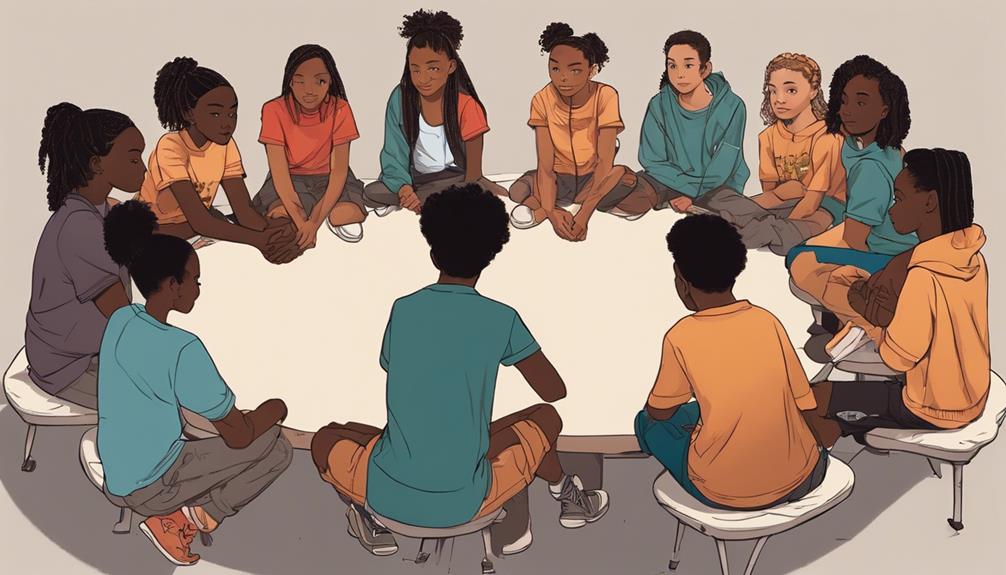During our tumultuous teenage years, the unforeseen turmoil of our parents’ divorce can make us feel disoriented and aimless.
However, there is a beacon of hope in the form of a practical guide tailored specifically for teens like us. This guide promises to equip us with essential tools to navigate the complexities of our changing family dynamics, offering a lifeline amidst the chaos.
So, how can we weather this storm and emerge stronger on the other side? Let's explore the strategies and insights this guide has to offer.
Key Takeaways
- Acknowledge and process emotions in healthy ways.
- Communicate openly with parents and seek support.
- Build a strong support system with trusted individuals.
- Prioritize self-care and seek help when needed.
Understanding the Situation
As teens, we must acknowledge and understand the changes in our family dynamics caused by our parents' divorce. It can be tough to grasp why this significant shift is happening, but it's crucial to remember that the separation is between our parents and doesn't reflect on us as individuals. Dealing with their parents' divorce requires us to recognize that the situation is complex and may evoke a range of emotions. We might feel confused, sad, guilty, or even resentful. These feelings are entirely valid, and it's okay to experience them.
Understanding the situation involves accepting that the divorce isn't our fault. Knowing this can help us navigate our emotions more effectively. It's essential to communicate with our parents about how we feel and seek support from trusted friends, family members, or counselors. By acknowledging the changes in our family dynamics and coming to terms with the situation, we can begin to cope with our parents' divorce in a healthier way.
Managing Your Emotions

Navigating the tumultuous sea of emotions that accompany your parents' divorce requires acknowledging and processing feelings like sadness, anger, and confusion with healthy coping strategies. It's essential to express these emotions in ways that feel right for you. Whether it's through journaling, talking to a trusted adult, or engaging in creative activities, finding an outlet can help you process and make sense of what you're feeling.
Learning healthy coping mechanisms, such as deep breathing, mindfulness, or seeking support from friends, is crucial for improving your emotional well-being. Remember, it's normal to experience a range of emotions during this time. If you find yourself overwhelmed, seeking professional help can provide you with additional support and guidance.
Taking care of yourself is vital. Developing self-care routines, maintaining social connections, and engaging in activities that bring you joy can help build emotional resilience during these challenging times. Remember, you aren't alone, and it's okay to seek help and support when needed.
Communicating With Your Parents
Open and honest communication with your parents plays a crucial role in navigating the challenges of their divorce. It's essential to guide and assist teens in fostering open communication with their parents during this difficult time.
Here are some ways to enhance communication with your parents:
- Express Yourself: Take the time to share your feelings and concerns with your parents. Let them know how their divorce is affecting you emotionally.
- Active Listening: Listen attentively to what your parents have to say. Understanding their perspective can help build empathy and strengthen your relationship.
- Ask Questions: Don't hesitate to ask questions or seek clarification when needed. Clear communication can help resolve misunderstandings and uncertainties that may arise during this period.
Building a Support System

During challenging times like your parents' divorce, it's crucial to establish a strong support system to help you navigate through this difficult period. Identifying trusted adults or friends whom you can confide in is essential. Additionally, seeking counseling or therapy services can provide a safe space to process your emotions and receive professional guidance.
Joining support groups or online forums can also be beneficial as you connect with others who are going through similar experiences, offering a sense of community and understanding.
Taking Care of Yourself
To care for ourselves during this challenging time of our parents' divorce, it's essential to prioritize self-care through adequate sleep, healthy eating, and regular physical activity.
- Get Enough Sleep: Rest is crucial for our bodies and minds to function well. Aim for 7-9 hours of sleep each night to feel refreshed and ready to face the day.
- Eat Well: Nourish your body with balanced meals rich in fruits, vegetables, lean proteins, and whole grains. Avoid excessive junk food or emotional eating, as it can impact your mood and energy levels.
- Stay Active: Engage in physical activities you enjoy, whether it's dancing, walking, or playing a sport. Exercise releases endorphins that boost your mood and reduce stress.
Frequently Asked Questions
How Long Does It Take to Get Over Your Parents Divorce?
Getting over your parents' divorce varies for each of us. Factors like age, support, and coping skills influence the healing process. Therapy can speed up healing. It's okay to take time to grieve and heal gradually.
What Not to Say to Kids During Divorce?
We should avoid blaming kids for the divorce, sharing inappropriate details, speaking negatively about the other parent, using them as messengers, or giving false hope. Such actions can harm their emotional well-being during this tough time.
What's the Hardest Age for Children to See Their Parents Split?
Seeing parents split can be toughest for kids aged 9 to 12. Their cognitive and emotional development makes them more sensitive. They may grapple with guilt, blame, and confusion, affecting their identity and security.
Which Age Group Has the Most Trouble Adjusting to Their Parents Divorce?
We understand that older adolescents, aged 12-18, often struggle the most when adjusting to their parents' divorce. Teens in this age group may face complex emotions and significant changes in family dynamics during this challenging time.
How Can Teens Cope with Custody Order Violations Resulting from Their Parents’ Divorce?
Teens can cope with common child custody order violations resulting from their parents’ divorce by seeking support from a trusted adult or counselor. It’s important for them to communicate their feelings and concerns with their parents and seek legal assistance if the violations persist.
Conclusion
As we journey through the complexities of our parents' divorce, it's crucial to remember we aren't alone. In fact, studies show that 40-50% of marriages in the United States end in divorce, highlighting the commonality of this experience.
By utilizing the tools and strategies outlined in this guide, we can navigate this challenging time with resilience and strength. Remember, we've the power to emerge from this process stronger and more resilient than ever before.
Stay strong, you've got this.










